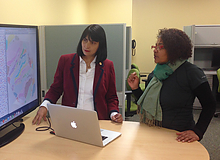 A University of Maryland data science expert and a former visiting scientist at the University of Maryland Institute for Advanced Computer Studies (UMIACS) recently finished work on a three-year research effort designed to help patients suffering from Alzheimer’s disease or lung cancer.
A University of Maryland data science expert and a former visiting scientist at the University of Maryland Institute for Advanced Computer Studies (UMIACS) recently finished work on a three-year research effort designed to help patients suffering from Alzheimer’s disease or lung cancer.
Louiqa Raschid (right in photo) and Maria-Esther Vidal (left) collaborated with a diverse group of scientists and clinicians from 10 research organizations in five European countries as part of an effort known as Project iASiS.
Funded by $5 million from the European Union, the iASiS researchers combined information from medical records, imaging databases, and genomics data to advance personalized diagnosis and treatment approaches for patients.
The project, which ended this summer, has produced innovative software that can be used by medical professionals. It has also developed new protocols and best practices related to big data and disease that can be used by policymakers.
Go here to see a video overview of the project.
Raschid, a professor in the Robert H. Smith School of Business with an appointment in UMIACS, has been collaborating with Vidal since the 1990s, when Vidal spent five years as a visiting research scientist in the institute.
For their work with iASiS, Raschid and Vidal were active in developing an electronic platform that automatically collects, integrates and analyzes large amounts of available patient data and makes the information more useful to clinicians providing treatment.
A number of steps were taken to produce the new platform, Vidal explains.
First, oncologists from the Spanish Lung Cancer Group and Madrid’s Health Service provided access to clinical data from lung cancer patients. Similarly, neurologists and specialists on Alzheimer’s from St. George’s, University of London and Alzheimer’s Research UK provided insights from aggregated dementia patient data and specialist knowledge to help technical teams represent this information in the iASiS Knowledge Graph (KG).
Then, scientists at the Polytechnic University of Madrid and the Centre for Genomic Regulation in Spain collaborated with researchers at NCSR Demokritos in Greece and the Leibniz University of Hannover, where Vidal currently has an appointment. Together, they analyzed clinical data and deciphered the genetic code in both Alzheimer’s and lung cancer. Raschid and Vidal worked closely to devise a unified schema, as well as semantic data integration techniques for aggregating clinical and genomic data with available literature and other open databases into the iASiS KG.
Through the analysis of the combined data, the iASiS researchers created the CogAware Module, which analyzes multilingual Alzheimer’s patients’ language data to detect interesting language biomarkers for early diagnosis.
The iASiS KG is accessible through the iASiS system and makes available the background knowledge required to uncover patterns that may explain the drug-drug interactions’ impact on the effectiveness of lung cancer treatments, Vidal says.
—Story by Melissa Brachfeld